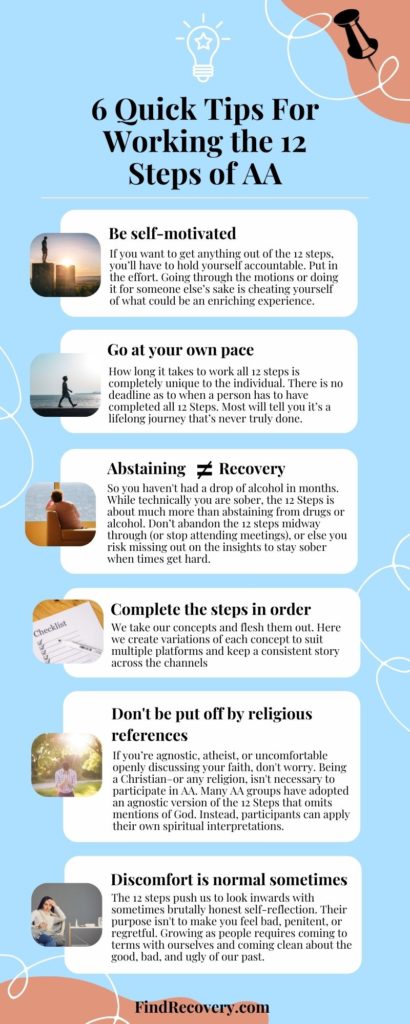For nearly a century, the 12 steps of AA have served as a foundation for recovering alcoholics. These dozen tenants have guided thousands through stages of admittance, self-awareness, gratitude, and forgiveness. But knowing the 12 steps is only part of the journey towards sobriety. To truly have these nuggets of wisdom be useful (and ultimately, living a sober and happy life) it’s crucial to understand how to work these steps and apply them to your everyday life. This easy and practical list of tips for working the 12 steps of AA will get you through it.
How To: Tips for Working the 12 Steps of AA

- Be self-motivated. Let’s clear one thing up: No one is going to follow up on you to make sure you’re giving each step its consideration and taking the lessons to heart. Not your sponsor, not chapter leadership, not other members. If you want to get anything out of the 12 steps, you’ll have to hold yourself accountable and really put in the effort. If you’re just going through the motions or doing it for someone else’s sake, you’re wasting your time and cheating yourself of what could be a very enriching experience.
- Take your time and go at your own pace. How long it takes to work all 12 steps is completely unique to the individual. The lessons of some steps will come naturally to you. Others may be more challenging and take days, or even weeks, to fully comprehend and put into practice. This is perfectly okay. Rushing through them for the sake of “finishing” benefits no one–especially yourself. There is no deadline as to when a person has to have completed all 12 Steps and most will tell you it’s a lifelong journey that’s never truly done.
- Abstaining from alcohol or drugs doesn’t mean you’re recovered. So you haven’t had a drop of alcohol in weeks, months, years. While technically you are sober, the 12 Steps is about much more than abstaining from drugs or alcohol. It’s about acknowledging the personal flaws that have led to this point and learning from them. Reckoning with your past as an addicted person, and using that as your motivation to remain abstinent. Don’t abandon the 12 steps midway through (or even worse, stop attending meetings), or else you risk missing out on the insights to stay sober when times get hard.
- Complete the steps in order. Being stuck on a step can be frustrating. If you aren’t making the progress you would like, you may be tempted to move on and proceed to the other steps—the end goal is the same, right? The beauty of the 12 step program is that each step builds upon the other in a very deliberate progression. You might miss out on a valuable perspective required to properly work through those later steps you’re rushing towards.
- Don’t be intimidated by religious references. If you’re agnostic, atheist, or uncomfortable openly discussing your faith, or anything in between, this tip is for you. Many individuals in recovery are put off or intimidated by the 12 Steps because of their frequent religious references. Bear in mind that Alcoholics Anonymous started as a Christian organization. It’s to be expected then, that those texts will carry some sort of religious mention. Do not feel that being a Christian–or any religion, is necessary to participate in AA. To better serve modern society, many AA groups have adopted a modified agnostic version of the 12 Steps that omits mentions of God and instead, calls on participants to apply their own spiritual interpretations.
- Prepare to be uncomfortable at times. There’s no sugar-coating it. The 12 steps push us to look inwards with sometimes brutally honest self-reflection. While many describe the feeling of completing these exercises as being freeing and exhilarating, in the moment, it can be disconcerting having to think about the not-so-great things we said, did, or thought, while under the control of drugs. For this reason it’s also very helpful to keep in mind that the purpose of the 12 steps is not to make you feel bad, penitent, or regretful. Growing as people requires coming to terms with ourselves and coming clean about the good, bad, and ugly of our past.
Keep these tips in mind as you work through the 12 steps. Whether it’s your first time doing them, or your 100th, remembering these fundamentals will put you in the right frame of mind for getting the most out of these tried-and-true lessons. Find a 12 Step group meeting near you to begin your healing journey today.

Glad its not too preachy. Never really started recovery. Went to rehab 30 days uhm about 4 year ago. Didn’t work out.
AA meetings off and on nothing consistent in between. Probably not enough .Definitely
I actually feel encouraged by post. Don;t know: I just feel tired of it.
Tired of my drinking. So sorry that I let ones tell me who I sought help years ago. ‘well, you only drinking beer and were dealing with more serious issues. Crack, meth? Whatever
Still, it’s up to me and I haven’t done better. I should be way beyond that point.
Im looking for AA meetings and know it’s in my best interest/life to do so
I attended my first ever AA meeting on Sunday with my son in law. I am not an alcoholic but he is, he knows he is. We lost my daughter Dec 9, 2021 very suddenly. Over the last three months we have over come tremendous obsticles but there are many more ahead. IDK the best way to help him, I pray for him all day everyday, he needs more than prayer and I need help. He does well while I’m there but I live in Ga and he and my grandboys live in Kentucky. Help me help him.